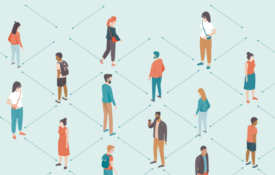-

Clinical Psychological Science Through the Lens of RDoC: New Advances and Future Directions
To commemorate the initiative’s 10th anniversary in 2020, the event will feature RDoC-informed research conducted by clinical psychological scientists and a special presentation by an RDoC representative.
-
The Good, the Bad and the ‘Radically Dishonest’
In this age of trolls and bots and digital impostors, words like “crank” and “bully” seem impossibly antiquated, like labels from the black-and-white TV era. “Scoundrel” almost qualifies as a term of endearment — culturally insensitive, for the purveyors of disinformation who parade with grim delight in the virtual public square. A more precise language is called for, a typology of lying and cheating that includes everyone, and sharpens the boundary between garden variety corner-cutting and deeper personality problems. Psychology is here to help.
-
Inside the Dangerous Mission to Understand What Makes Extremists Tick—and How to Change Their Minds
On a cool winter’s day in early 2014, the American academic Nafees Hamid was invited for tea at the second-story at the Barcelona apartment of a young Moroccan man. It started well enough; they sat down at the kitchen table, chatting amiably in French while two acquaintances of the host sat nearby in the living room. Halfway through the conversation, though, things took a turn. “He started saying things like, ‘Why should we trust any Westerner?’” Hamid recalls. “‘Why would we not kill every one of them? Why should I even trust you—you are an American—sitting here?
-
Is It Possible to Rid Police Officers of Bias?
The killing of George Floyd by police officers in Minneapolis three months ago and the shooting of Jacob Blake by police in Wisconsin have led the US to a period of reckoning. As thousands have marched in the streets to protest against racial inequality, many others have also been forced to ask some difficult questions about their levels of prejudice. While some people mistake racism as being only overt prejudice, there is another crucial component that affects our decisions and actions towards others: implicit bias.
-
Academia Needs a Reality Check: Life is Not Back to Normal
APS Member/Author: Leah H. Somerville Academic scientists are facing an ominous start to the academic year. Some universities are welcoming students back to campus with detailed COVID-19 testing and prevention guidelines. Others have suddenly retracted in-person plans, moving to fully online courses as coronavirus cases spiked. “We all should be emotionally prepared for widespread infections — and possibly deaths — in our community,” a professor at Yale University wrote to students in a 1 July email. The problems don’t end there. Many academics are also grappling with ongoing racial injustices and associated protests, wildfires, and hurricanes.
-

Friendly and Open Societies Supercharged the Early Spread of COVID-19
The case to “flatten the curve” is bolstered by new data showing a connection between social openness and the initial rapid spread of COVID-19.

